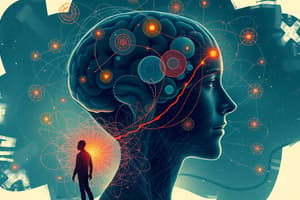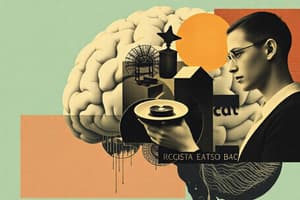Podcast
Questions and Answers
What is one of the primary goals of psychology?
What is one of the primary goals of psychology?
- To understand individuals and groups (correct)
- To eliminate all mental illnesses
- To strictly classify people into categories
- To control human behavior entirely
Which historical perspective is associated with the study of consciousness and mental processes?
Which historical perspective is associated with the study of consciousness and mental processes?
- Behaviorism
- Functionalism
- Structuralism (correct)
- Cognitive Psychology
What is a subfield of psychology that focuses on the influence of social interactions on behavior?
What is a subfield of psychology that focuses on the influence of social interactions on behavior?
- Clinical Psychology
- Developmental Psychology
- Cognitive Psychology
- Social Psychology (correct)
Which of the following is NOT an early school of thought in psychology?
Which of the following is NOT an early school of thought in psychology?
What aspect distinguishes modern schools of psychology from early schools?
What aspect distinguishes modern schools of psychology from early schools?
Which branch of psychology primarily deals with mental disorders and their treatment?
Which branch of psychology primarily deals with mental disorders and their treatment?
The focus of functionalism in psychology is to understand:
The focus of functionalism in psychology is to understand:
Which of the following definitions best captures the essence of psychology?
Which of the following definitions best captures the essence of psychology?
What was the primary focus of behaviorism according to John B. Watson?
What was the primary focus of behaviorism according to John B. Watson?
Which of the following is NOT a characteristic of behaviorism as described in the content?
Which of the following is NOT a characteristic of behaviorism as described in the content?
Who is recognized as the founder of psychoanalysis?
Who is recognized as the founder of psychoanalysis?
What did Freud believe about the causes of some physical illnesses?
What did Freud believe about the causes of some physical illnesses?
What was a significant criticism of psychology before the advent of behaviorism?
What was a significant criticism of psychology before the advent of behaviorism?
According to behaviorism, how are learners described?
According to behaviorism, how are learners described?
Which statement best describes the contribution of behaviorism to psychology?
Which statement best describes the contribution of behaviorism to psychology?
What common ground do the three schools of thought discussed share?
What common ground do the three schools of thought discussed share?
What is the primary focus of psychology as introduced in this module?
What is the primary focus of psychology as introduced in this module?
Which chapter discusses the principles and characteristics of learning?
Which chapter discusses the principles and characteristics of learning?
What components of motivation are included in the module?
What components of motivation are included in the module?
Which theory of personality is NOT discussed in this module?
Which theory of personality is NOT discussed in this module?
What does Chapter Four primarily focus on?
What does Chapter Four primarily focus on?
In which chapter are psychological disorders discussed?
In which chapter are psychological disorders discussed?
What is one of the main focuses of Chapter Eight?
What is one of the main focuses of Chapter Eight?
Which of the following is a factor discussed in relation to memory?
Which of the following is a factor discussed in relation to memory?
Which factor affects an observer's attention by making them primed for certain sensory input?
Which factor affects an observer's attention by making them primed for certain sensory input?
What psychological state can lead a person to focus on stimuli related to their current needs?
What psychological state can lead a person to focus on stimuli related to their current needs?
When a husband hears the phone ring while his wife does not, what concept best explains this phenomenon?
When a husband hears the phone ring while his wife does not, what concept best explains this phenomenon?
Why might a hungry person pay more attention to food-related stimuli than their friend?
Why might a hungry person pay more attention to food-related stimuli than their friend?
Which characteristic of stimuli is least likely to influence attention on its own?
Which characteristic of stimuli is least likely to influence attention on its own?
What is one reason for the difference in attention between a person listening to music and a friend hearing conversations outside?
What is one reason for the difference in attention between a person listening to music and a friend hearing conversations outside?
Which of the following statements best captures the relationship between attention and psychological states?
Which of the following statements best captures the relationship between attention and psychological states?
In what way do motives and needs affect perception during an event like a football game?
In what way do motives and needs affect perception during an event like a football game?
What allows the brain to maintain the perception of an object as rectangular despite its angle relative to the viewer?
What allows the brain to maintain the perception of an object as rectangular despite its angle relative to the viewer?
Why does a white shirt maintain its brightness under different lighting conditions when combined with nonwhite objects?
Why does a white shirt maintain its brightness under different lighting conditions when combined with nonwhite objects?
What phenomenon explains why the moon appears larger at the horizon than overhead?
What phenomenon explains why the moon appears larger at the horizon than overhead?
In Edgar Allen Poe's story, what visual cue led to the man's misperception of the animal?
In Edgar Allen Poe's story, what visual cue led to the man's misperception of the animal?
How does brightness constancy function when observing an object alone under dim light?
How does brightness constancy function when observing an object alone under dim light?
Which of the following illusions is primarily studied for understanding size perception?
Which of the following illusions is primarily studied for understanding size perception?
What does the Muller-Lyer illusion demonstrate about our perception?
What does the Muller-Lyer illusion demonstrate about our perception?
Which explanation accounts for a white shirt looking dull when viewed alone in dim light?
Which explanation accounts for a white shirt looking dull when viewed alone in dim light?
What is the primary function of depth perception in a three-dimensional world?
What is the primary function of depth perception in a three-dimensional world?
Which of the following best describes retinal disparity?
Which of the following best describes retinal disparity?
What occurs when you look at an object with one eye closed and then the other?
What occurs when you look at an object with one eye closed and then the other?
What is convergence in terms of depth perception?
What is convergence in terms of depth perception?
How does drinking alcohol affect depth perception?
How does drinking alcohol affect depth perception?
Which statement is true regarding monocular cues?
Which statement is true regarding monocular cues?
Which aspect of depth perception involves neural activity in the visual cortex?
Which aspect of depth perception involves neural activity in the visual cortex?
The term 'binocular cues' refers to which of the following?
The term 'binocular cues' refers to which of the following?
Flashcards
What is Psychology?
What is Psychology?
The scientific study of the human mind and behavior.
Goals of Psychology
Goals of Psychology
To describe, explain, predict, and control human behavior and mental processes.
Early Schools of Psychology
Early Schools of Psychology
Early schools of thought in psychology, including Structuralism, Functionalism, and Psychoanalysis.
Modern Schools of Psychology
Modern Schools of Psychology
Signup and view all the flashcards
Branches of Psychology
Branches of Psychology
Signup and view all the flashcards
What is Perception?
What is Perception?
Signup and view all the flashcards
Definition of Learning
Definition of Learning
Signup and view all the flashcards
Behavioral Theory of Learning
Behavioral Theory of Learning
Signup and view all the flashcards
What is Memory?
What is Memory?
Signup and view all the flashcards
Definition of Motivation
Definition of Motivation
Signup and view all the flashcards
Definition of Emotion
Definition of Emotion
Signup and view all the flashcards
Definition of Personality
Definition of Personality
Signup and view all the flashcards
Attention-grabbing Stimuli
Attention-grabbing Stimuli
Signup and view all the flashcards
Psychological States and Attention
Psychological States and Attention
Signup and view all the flashcards
Set or Expectancy in Attention
Set or Expectancy in Attention
Signup and view all the flashcards
Example of Set in Attention
Example of Set in Attention
Signup and view all the flashcards
Motives and Needs in Attention
Motives and Needs in Attention
Signup and view all the flashcards
Motives and Needs in Perception (Football Game)
Motives and Needs in Perception (Football Game)
Signup and view all the flashcards
Friend's Different Focus (Music vs Conversation)
Friend's Different Focus (Music vs Conversation)
Signup and view all the flashcards
Contextual Influence on Perception (Symbol 13)
Contextual Influence on Perception (Symbol 13)
Signup and view all the flashcards
Behaviorism
Behaviorism
Signup and view all the flashcards
John B. Watson
John B. Watson
Signup and view all the flashcards
Conditioned Response
Conditioned Response
Signup and view all the flashcards
Unconscious Mind
Unconscious Mind
Signup and view all the flashcards
Sigmund Freud
Sigmund Freud
Signup and view all the flashcards
Non-Physical Causes of Illness
Non-Physical Causes of Illness
Signup and view all the flashcards
Psychoanalysis
Psychoanalysis
Signup and view all the flashcards
Unconscious Influence on Behavior
Unconscious Influence on Behavior
Signup and view all the flashcards
Depth perception
Depth perception
Signup and view all the flashcards
Retinal disparity
Retinal disparity
Signup and view all the flashcards
Convergence
Convergence
Signup and view all the flashcards
Binocular cues
Binocular cues
Signup and view all the flashcards
Monocular cues
Monocular cues
Signup and view all the flashcards
Importance of depth perception
Importance of depth perception
Signup and view all the flashcards
Depth perception impairment
Depth perception impairment
Signup and view all the flashcards
Integration of depth cues
Integration of depth cues
Signup and view all the flashcards
Shape Constancy
Shape Constancy
Signup and view all the flashcards
Brightness Constancy
Brightness Constancy
Signup and view all the flashcards
Perceptual Illusion
Perceptual Illusion
Signup and view all the flashcards
Muller-Lyer Illusion
Muller-Lyer Illusion
Signup and view all the flashcards
The Moon Illusion
The Moon Illusion
Signup and view all the flashcards
Size Constancy
Size Constancy
Signup and view all the flashcards
Study Notes
General Psychology (Psyc 1011)
- Contributors include:
- Koye Kassa, Bahir Dar University (Chapters 1, 5, and 6)
- Belay Tefera, Addis Ababa University (Chapter 2)
- Aemero Asmamaw, University of Gondar (Chapters 3, 4, and 7)
- Habtamu Disasa, Dilla University (Chapters 8, 9, 10, and 11)
- Revised and edited by Belay Tefera, Addis Ababa University
- Publication date: September 2019
Table of Contents
- The document lists the chapter titles and page numbers for a General Psychology textbook.
- Chapters cover topics like the definition of psychology, sensation and perception, learning and theories of learning, memory and forgetting, motivation and emotions, personality, psychological disorders and treatment, life skills, and academic skills.
Studying That Suits You
Use AI to generate personalized quizzes and flashcards to suit your learning preferences.




